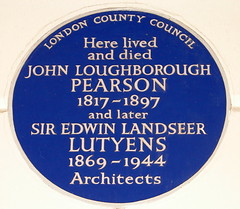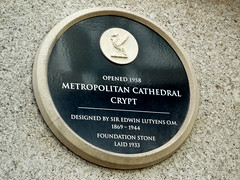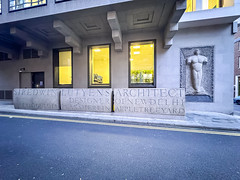Sir Edwin Lutyens OM FRIBA RA KCIE


Sir Edwin Lutyens OM FRIBA RA KCIE
(1869-1944)
architect, Royal Academician, Fellow of the Royal Institute of British Architects, Knight Commander of the Order of the Indian Empire, Knight Bachelor (from 1918), and Order of Merit recipient (from 1942)
Commemorated on 6 plaques
Here lived and died John Loughborough Pearson 1817-1897 and later Sir Edwin Landseer Lutyens 1869-1944 architects
13 Mansfield Street, Westminster, W1, London, United Kingdom where they lived and died (1944)
King George V Memorial. Designed by Sir Edwin Lutyens, unveiled on 23rd April 1937 by King George VI
George V Memorial, Edward VII Avenue, Windsor, United Kingdom where they designed
The Drum Inn, Cockington Village (completed in 1936) designed by the architect Sir Edwin Lutyens RA OM KCIE born 29th March 1869 died 1st January 1944
Drum Inn, Cockington Village, Torquay, United Kingdom where they designed
Opened 1958 Metropolitan Cathedral Crypt Designed by Sir Edwin Lutyens O.M. 1869-1944 Foundation stone laid 1933
Metropolitan Cathedral Crypt, Brownlow Hill, Liverpool, United Kingdom where they designed
This building was specifically designed for the Liberal Club in 1894 by the Architect Sir Edwin Lutyens (1869-1944). It was his first complete Georgian building and was built with a mortgage provided by Arthur Chapman of Crooksbury, Chairman of the Farnham Liberals.
South Street, Farnham, United Kingdom where they designed (1894)
Sir Edwin Lutyens Architect Designer of New Delhi laid out his plans here in Apple Tree Yard
Apple Tree Yard, London, United Kingdom where they designed






